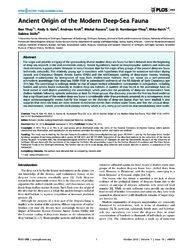Ancient Origin of the Modern Deep-Sea Fauna
Thuy, Ben
Gale, Andy S.
Kroh, Andreas
Kucera, Michal
Numberger-Thuy, Lea D.
Stöhr, Sabine
7, 10: -
DOI: https://doi.org/10.1371/journal.pone.0046913
Persistent URL: http://resolver.sub.uni-goettingen.de/purl?gldocs-11858/6997
Persistent URL: http://resolver.sub.uni-goettingen.de/purl?gldocs-11858/6997
Thuy, Ben; Gale, Andy S.; Kroh, Andreas; Kucera, Michal; Numberger-Thuy, Lea D.; Reich, Mike; Stöhr, Sabine, 2012: Ancient Origin of the Modern Deep-Sea Fauna. In: PLoS ONE, Band 7, 10, DOI: 10.1371/journal.pone.0046913.
 |
Dokument öffnen: |
The origin and possible antiquity of the spectacularly diverse modern deep-sea fauna has been debated since the beginning of deep-sea research in the mid-nineteenth century. Recent hypotheses, based on biogeographic patterns and molecular clock estimates, support a latest Mesozoic or early Cenozoic date for the origin of key groups of the present deep-sea fauna (echinoids, octopods). This relatively young age is consistent with hypotheses that argue for extensive extinction during Jurassic and Cretaceous Oceanic Anoxic Events (OAEs) and the mid-Cenozoic cooling of deep-water masses, implying repeated re-colonization by immigration of taxa from shallow-water habitats. Here we report on a well-preserved echinoderm assemblage from deep-sea (1000–1500 m paleodepth) sediments of the NE-Atlantic of Early Cretaceous age (114 Ma). The assemblage is strikingly similar to that of extant bathyal echinoderm communities in composition, including families and genera found exclusively in modern deep-sea habitats. A number of taxa found in the assemblage have no fossil record at shelf depths postdating the assemblage, which precludes the possibility of deep-sea recolonization from shallow habitats following episodic extinction at least for those groups. Our discovery provides the first key fossil evidence that a significant part of the modern deep-sea fauna is considerably older than previously assumed. As a consequence, most major paleoceanographic events had far less impact on the diversity of deep-sea faunas than has been implied. It also suggests that deep-sea biota are more resilient to extinction events than shallow-water forms, and that the unusual deep-sea environment, indeed, provides evolutionary stability which is very rarely punctuated on macroevolutionary time scales.
Statistik:
ZugriffsstatistikSammlung:
- Geologie [930]


